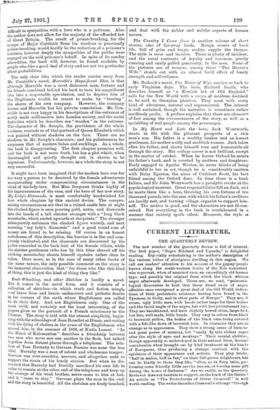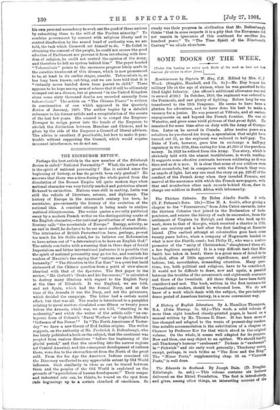C URRENT LITERATURE.
THE QUARTERLY REVIEW.
The new number of the Quarterly Review is full of interest. The first paper, "Negro Nileland and Uganda," is delightful reading. Especially entertaining is the author's description of the various tribes of aborigines dwelling in this region. We call our readers' attention to his account of the pygmy people known along the south-western limits of the Nile watershed who represent, when of unmixed race, an exceedingly old human type, and possibly the original from which the black African negro afterwards developed. There are, we read, "paleonto- logical discoveries to hint that these dwarf races of negro affinities once overspread a great deal of the Old World, indica- tions of their prehistoric existence having been found in the Pyrenees, in Sicily, and in other parts of Europe." They are, it seems, ugly little men, with heads rather largo for their bodies and the facial angle of the negro, but with less protruberant lips. They are knockkneed, and have slightly bowed shins, large feet, but fine, well-made, little bands. They vary in colour from black to brownish yellow, the bodies of the black ones being covered with a felt-like down of brownish hair. In character they are as strange as in appearance. They show a strong sense of humour and great power of mimicry, but "easily fly into violent rages after the style of apes and monkeys." Their mental abilitie', though apparently so undeveloped in their natural lives, become considerable when brought out by kind treatment at the hands of Europeans, thus producing a strange contrast with the apishness of their appearance and actions. They play tricks, "half in malice, half in fun," on their full-grown neighbours, but can be kindly to those they like, "often, as in fairy tales, per- forming some friendly little service unseen, or leaving some gift during the hours of darkness." Are we really, as the Quarterly Reviewer does not hesitate to suggest, on the track of the fairies ? An article on " The Protectorate of Oliver Cromwell" is welt worth reading. The writer describes Crom weirs attempt "through his own personal ascendency to work out the good of three nations by submitting them to the will of the Puritan minority." To combine government by consent with religious liberty and to control disaffection by the armed hand of authority was, we are told, the teak which Cromwell set himself to do. "He failed in obtaining the consent of the people, he could not secure the good affection of Parliament nor prevent it from interfering with free- dom of religion, he could not control the opinion of the Army, and therefore he left no system behind him." The paper headed "Tuberculosis" points to the enormous progress lately made in the curative treatment of this disease, which is now pronounced to be, at least in its earlier stages, curable. Tuberculosis is, as has long been known, catching, and we are here told that it is virtually never handed down from parent to child." There appears to be hope among men of science that it will be ultimately stamped out as a disease, but at present "in the United Kingdom alone some sixty thousand deaths are recorded annually from tuberculosis." The article on "The Chinese Fiasco" is written in continuation of one which appeared in the Quarterly Review of January, 1900. The author begins by a detailed reference to his former article and a recapitulation of the events of the last few years. His counsel is to compel the Empress- Dowager to resign power into the bands of the Emperor, to abolish the distinction between Manchus and Chinese, and to place by the side of the Emperor a Council of liberal advisers. The advice is excellent if practicable, but how to make it prac- ticable without supporting the Council, which would require incessant interference, we do not see.



































 Previous page
Previous page